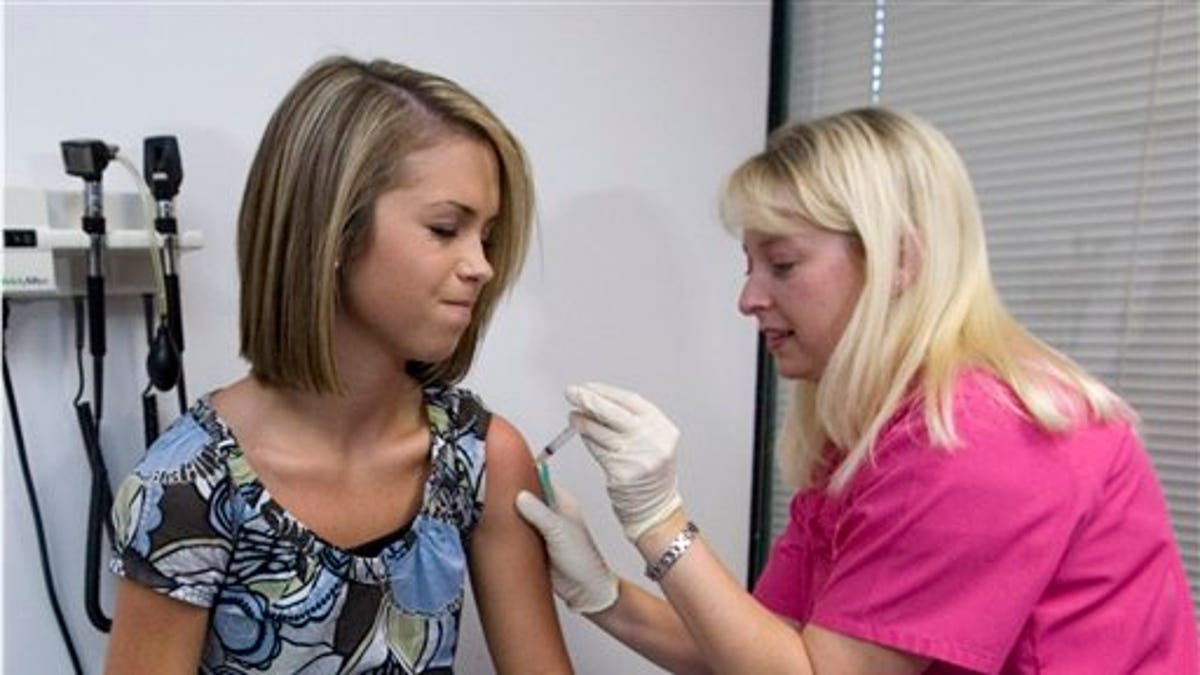
FILE - In this Tuesday, Dec. 18, 2007 file photo, Lauren Fant, left, winces as she has her third and final application of the Human Papillomavirus (HPV) vaccine administered by nurse Stephanie Pearson at a doctor&'s office in Marietta, Ga. (AP Photo/John Amis, File)
The human papillomavirus (HPV) vaccine is intended to prevent people from getting infected with the virus, but in some cases, it may actually work as a treatment, clearing warts in people who are already infected, a new report suggests.
The report describes several cases of people who had persistent oral warts that went away soon after they received the HPV vaccine. While it's too early to say for certain whether the HPV vaccine treated the warts, the researchers said formal studies should look at this question.
"There remains a critical need for randomized clinical trials to assess efficacy of quadrivalent HPV vaccination for treatment" of oral warts, the researchers said.
The report highlights the case of a man in his 60s who had recurrent warts on his lips, tongue and cheeks for 18 months. The man tried to have the warts removed, but they kept coming back. Doctors diagnosed the man with an HPV infection. There are more than 150 strains of HPV, and although most infections go away on their own, some can linger and lead to health problems, such as genital warts, oral warts, cervical cancer or oral cancer. [Quiz: Test Your STD Smarts]
Dr. John Stern, of the Division of Infectious Diseases at the University of Pennsylvania Health System, who treated the man and co-authored the new report, said he told the patient that there wasn't anything more the doctors could do for his warts. But Stern suggested that the man get the HPV vaccine because he thought it would protect the patient from becoming infected with other HPV strains that are linked with cancer.
The man received the quadrivalent HPV vaccine, which protects against four HPV strains. "We immunized him — not with any therapeutic benefit in mind," Stern said. The vaccine is typically given to children before they become sexually active — it is not thought to help with existing HPV infections.
But a month after the patient received the first dose of the HPV vaccine, he showed significant improvement, and within three months, the warts went away.
"They were all gone; they just disappeared," Stern told Live Science. Stern told a colleague. "We both sort of said, 'Wow,'" Stern said.
Now, two years later, the patient is still free of oral warts.
To see if this had happened in any other patients, the researchers scoured the literature, and found that since 2010, there have been eight other reports of people whose warts disappeared after they received the HPV vaccine. Some of these patients experienced an improvement just two to three weeks after vaccination.
In one case, a 41-year-old woman with widespread warts had not received treatment for her warts for 10 years, but many of her warts cleared about six months after she received the HPV vaccine.
However, it's possible for warts caused by HPV to just go away on their own, so more research is needed to confirm that the vaccine is indeed responsible for these cases, Stern said.
And not all people who receive the HPV vaccine have their warts disappear. A 2013 study of six people with genital warts found that all of the patients had their warts come back after they received the HPV vaccine. Moreover, a 2007 study of more than 2,000 women with genital HPV infections found that the HPV vaccine did not accelerate the speed at which the women's bodies cleared the infection.
"These case report shouldn't prompt every person with HPV to then go and demand to be vaccinated," said Dr. Amesh Adalja, an infectious-disease specialist and a senior associate at the University of Pittsburgh Medical Center's Center for Health Security, who was not involved with the new report. "This isn't something that happens to every person that has the vaccine," Adalja said.
However, the report should prompt researchers to try to understand why some people appear to benefit from getting the vaccine even after they have an HPV infection, while others don't, Adalja said.
It may be that the warts cleared in the 60-year-old man because the HPV vaccine boosted his immune response to all HPV strains, even though the strain that the man had was not in the vaccine, Adalja said.
If it turns out that the HPV vaccine does help with some cases of HPV-related warts, it would be one of the few examples of a vaccine that treats, rather than prevents, disease. There are some experimental vaccines that are aimed at treating cancer and HIV, Adalja noted.
The new report was published online Sept. 2 in the journal JAMA Dermatology.
Copyright 2015 LiveScience, a Purch company. All rights reserved. This material may not be published, broadcast, rewritten or redistributed.
